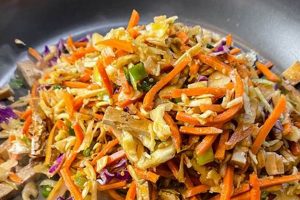A plant-based culinary creation designed to mimic the texture and flavor profile of traditional oxtails, this dish utilizes ingredients like mushrooms, seitan, or jackfruit to replicate the rich, savory experience typically associated with slow-cooked beef. Preparations often involve braising these meat alternatives in a flavorful broth with herbs, spices, and vegetables, mirroring the traditional cooking process. A common presentation involves serving the braised components over rice, mashed potatoes, or polenta, accompanied by the flavorful braising liquid as a sauce.
The appeal stems from its ability to offer a familiar comfort food experience to individuals adhering to vegan or vegetarian diets. Benefits include providing a plant-based source of protein and fiber, and reducing reliance on animal products. The concept taps into the growing demand for ethical and sustainable food options, allowing consumers to enjoy traditionally meat-heavy dishes without compromising their dietary principles. The emergence of such culinary innovations reflects a broader trend towards plant-based alternatives in mainstream cuisine.
The following sections will delve into the specific ingredients commonly used in this preparation, explore various cooking techniques for achieving optimal texture and flavor, and examine the nutritional profile of this evolving vegan dish. Furthermore, the article will provide insights into sourcing ingredients and adapting traditional recipes to create compelling plant-based interpretations.
Culinary Guidance
The following recommendations aim to optimize the preparation and enjoyment of plant-based oxtail alternatives, focusing on techniques that enhance flavor, texture, and overall culinary satisfaction.
Tip 1: Select Appropriate Base Ingredients: Consider the textural properties of available plant-based options. Mushrooms, particularly king oyster mushrooms, offer a naturally meaty texture. Seitan, due to its gluten content, can be manipulated to achieve a similar fibrous quality. Jackfruit, especially when young and unripe, provides a neutral base that absorbs flavors effectively.
Tip 2: Prioritize Intense Umami Flavors: Replicating the depth of flavor found in traditional oxtails requires strategic layering of umami-rich ingredients. Incorporate dried mushrooms (rehydrated, with the soaking liquid reserved), tomato paste (caramelized for added depth), nutritional yeast, soy sauce or tamari, and vegetable bouillon to create a savory foundation.
Tip 3: Employ Low and Slow Cooking Methods: Braising is essential for tenderizing the plant-based components and allowing the flavors to meld. Simmering the ingredients in a rich broth for an extended period (several hours) is crucial for achieving the desired result.
Tip 4: Develop a Complex Broth: The braising liquid significantly contributes to the final flavor profile. Build a flavorful broth using aromatics (onions, garlic, celery, carrots), herbs (thyme, bay leaf), and spices (smoked paprika, black peppercorns). The addition of red wine (if appropriate) can further enhance the complexity.
Tip 5: Control Moisture Levels: Maintaining the correct level of liquid throughout the cooking process is vital. Overly dry conditions can lead to burning, while excessive moisture results in a diluted flavor. Monitor the liquid levels and adjust as needed, adding small amounts of broth or water to prevent sticking.
Tip 6: Sear for Added Depth: Before braising, searing the main ingredients, such as mushrooms or seitan, helps to develop a rich, browned crust and adds another layer of flavor to the dish.
Tip 7: Consider Smoke Infusion: Introducing a smoky element can greatly enhance the overall flavor, bringing it closer to the traditional profile. This can be achieved through the use of smoked paprika, liquid smoke (used sparingly), or by incorporating smoked vegetables into the broth.
By adhering to these recommendations, chefs and home cooks can produce plant-based oxtail dishes that offer a satisfying and flavorful alternative to the traditional preparation. Careful selection of ingredients, strategic flavor layering, and patient cooking techniques are key to success.
The following section will explore specific recipes and variations, providing practical guidance for recreating this plant-based culinary option.
1. Plant-based protein sources
The successful creation hinges on the selection and preparation of appropriate plant-based protein sources. These ingredients function as the structural backbone, providing the texture and substance previously derived from animal products. The choice of protein source directly impacts the final product’s mouthfeel, flavor absorption, and overall nutritional profile. For instance, seitan, composed of wheat gluten, offers a dense, chewy texture that mimics the feel of slow-cooked meat. Mushrooms, particularly king oyster mushrooms, possess a naturally meaty consistency and impart an earthy umami flavor. Jackfruit, in its unripe form, provides a neutral base that readily absorbs the flavors of the braising liquid. The decision of which ingredient to use, or a combination thereof, is paramount to the authenticity and appeal of the vegan adaptation.
The utilization of these ingredients extends beyond mere structural replacement. Each protein source offers unique culinary advantages. Seitan, due to its high protein content, contributes to the dish’s satiety factor. Mushrooms provide essential micronutrients and enhance the savory depth of the flavor profile. Jackfruit, being relatively low in calories, allows for a lighter, more health-conscious interpretation. Furthermore, the preparation methods employed significantly influence the final outcome. Marinating or pre-seasoning the protein source ensures deep flavor penetration, while proper cooking techniques, such as searing or slow-braising, contribute to the desired tenderness and texture.
Ultimately, the selection and strategic application of plant-based protein sources is fundamental to the palatability and nutritional value. The effectiveness of this culinary approach hinges on replicating the sensory experience of traditional, while adhering to ethical and dietary considerations. Overcoming challenges related to texture and flavor often requires experimentation and a thorough understanding of the properties of various plant-based proteins. The continuous refinement of these techniques contributes to the growing acceptance and appreciation of this innovative dish.
2. Umami Flavor Development
Umami, often described as a savory or meaty taste, is a cornerstone in replicating the deeply satisfying flavor profile of traditional oxtails in a vegan context. The absence of animal-derived collagen and fat necessitates a deliberate strategy to build this flavor dimension through plant-based ingredients. Achieving a successful vegan dish directly correlates with the effective implementation of umami-enhancing techniques, which compensate for the missing inherent flavors present in the conventional version. Failure to adequately address this aspect results in a bland or unsatisfying imitation, failing to capture the essence of the original dish.
The development of umami in vegan involves the strategic combination of ingredients rich in glutamates and nucleotides, which synergistically amplify the savory sensation. Examples include dried mushrooms (shiitake, porcini), which release concentrated glutamates upon rehydration, imparting a distinct depth of flavor to the braising liquid. Caramelized tomato paste contributes both sweetness and glutamates, deepening the overall taste. Nutritional yeast, with its cheesy and savory notes, adds further umami complexity. The inclusion of soy sauce or tamari, fermented condiments high in glutamates, also plays a crucial role. A carefully constructed vegetable broth, simmered with aromatics and umami-rich vegetables, serves as the foundation for a balanced and flavorful braising medium. The careful layering and interaction of these components are essential for achieving the desired outcome.
In summary, umami flavor development is not merely an additive element but a fundamental principle in the creation of vegan oxtails. It requires a deliberate approach, incorporating specific ingredients and techniques to compensate for the absence of animal products. Overcoming the challenges of replicating the savory depth of the original dish is essential for its acceptance and culinary success. Further research into plant-based umami sources and cooking methods will continue to refine the art of creating compelling and satisfying vegan alternatives.
3. Slow-cooking Techniques
Slow-cooking techniques are integral to the successful preparation of vegan oxtails. These methods facilitate the tenderization of plant-based protein sources and the infusion of flavors, effectively mimicking the attributes of traditionally prepared oxtails. The extended cooking time allows for the breakdown of cell walls in vegetables and the absorption of braising liquids, resulting in a palatable and flavorful dish.
- Tenderization of Plant-Based Proteins
Vegan oxtails rely on ingredients such as seitan, mushrooms, or jackfruit. These components often require prolonged cooking at low temperatures to achieve a tender texture. Slow-cooking breaks down the fibrous structure of these ingredients, rendering them more palatable and comparable to the texture of braised meat. For example, the slow braising of king oyster mushrooms transforms their initially firm texture into a succulent, meat-like consistency.
- Flavor Infusion and Development
Extended cooking times enable plant-based proteins to fully absorb the flavors of the braising liquid. This process is crucial for imbuing the with the desired savory profile. A low and slow cooking environment allows for the gradual melding of herbs, spices, and vegetables, resulting in a more complex and nuanced flavor. For instance, braising seitan allows it to fully soak up the flavors of the broth, becoming imbued with umami and depth.
- Collagen Mimicry Through Reduced Sauces
Traditional oxtails benefit from the breakdown of collagen, which enriches the sauce and contributes to its mouthfeel. Slow reduction of the braising liquid in vegan oxtails replicates this effect by concentrating the flavors and creating a rich, viscous sauce. The slow simmering process encourages the natural thickening of the sauce, resulting in a similar texture to that achieved through collagen breakdown.
- Enhanced Digestibility
Slow-cooking methods can improve the digestibility of certain plant-based ingredients. The extended cooking time assists in breaking down complex carbohydrates and proteins, making them easier to digest. This is particularly beneficial for individuals with sensitive digestive systems or those unaccustomed to consuming large quantities of plant-based foods. The gentle cooking process minimizes the risk of digestive discomfort associated with less thoroughly cooked ingredients.
The utilization of slow-cooking techniques is indispensable to achieve a satisfactory sensory experience in vegan oxtails. These methods address the textural and flavor challenges inherent in replacing animal products with plant-based alternatives, resulting in a dish that closely resembles its traditional counterpart in terms of taste and tenderness.
4. Braising liquid composition
The composition of the braising liquid is paramount to the flavor development and overall success of vegan oxtails. As a plant-based adaptation of a traditionally meat-centric dish, the braising liquid serves as the primary vehicle for infusing the plant-based proteins with the desired savory characteristics, compensating for the absence of inherent flavors derived from animal collagen and fat. The liquid’s components must work synergistically to create a complex and satisfying flavor profile that mimics the richness and depth of traditional braised oxtails. A deficient braising liquid will invariably result in a bland and unappealing dish, regardless of the quality of other ingredients or cooking techniques.
Typical braising liquids for vegan oxtails incorporate a base of vegetable broth, often enriched with ingredients such as dried mushrooms (rehydrated, with the soaking liquid retained for added umami), tomato paste (caramelized for intensified flavor), soy sauce or tamari (for saltiness and umami), and a combination of aromatic vegetables like onions, garlic, carrots, and celery. Herbs and spices such as thyme, bay leaf, smoked paprika, and black peppercorns are frequently added to enhance the aromatic complexity. Some recipes incorporate red wine for added depth and acidity. The specific proportions and combinations of these ingredients are crucial, requiring a delicate balance to prevent any single flavor from overpowering the others. The liquids role extends beyond flavor infusion; it also contributes to the texture of the finished dish. As the dish braises, the liquid reduces and thickens, coating the plant-based proteins and creating a rich, flavorful sauce. Proper adjustment of liquid levels during cooking is essential to prevent either burning or excessive dilution of flavors.
In summary, the braising liquid is an indispensable component of vegan oxtails, functioning as both a flavor carrier and a textural element. Its carefully crafted composition is essential for replicating the savory depth and richness of traditional braised oxtails in a plant-based context. The strategic use of umami-rich ingredients, aromatics, herbs, and spices, combined with precise control of liquid levels during cooking, is critical for achieving a successful and satisfying outcome. The development of innovative braising liquid formulations will likely remain a key area of focus for chefs and culinary enthusiasts seeking to refine and elevate this vegan adaptation.
5. Ingredient availability
The feasibility and widespread adoption of vegan oxtails are intrinsically linked to the accessibility of its constituent ingredients. The practicality of preparing this dish hinges on the consistent supply and affordability of the necessary plant-based components, which directly influence its appeal and potential for culinary integration.
- Regional Disparities in Sourcing Specific Ingredients
Availability of certain key ingredients, such as specific varieties of mushrooms (e.g., king oyster) or jackfruit (young, green), can vary significantly depending on geographical location. Regions with established Asian or international markets often have greater access to jackfruit, while the cultivation and distribution of specialty mushrooms may be concentrated in specific areas. This uneven distribution can limit the preparation of vegan oxtails in regions where these ingredients are less readily available, necessitating substitutions or modifications to the recipe.
- Impact of Seasonal Variations on Vegetable Quality and Cost
The quality and cost of vegetables used in the braising liquid, such as onions, carrots, celery, and tomatoes, are subject to seasonal fluctuations. During peak seasons, these ingredients are typically more affordable and of higher quality, facilitating cost-effective preparation of vegan oxtails. Conversely, during off-seasons, prices may increase, and the quality may decline, potentially impacting the overall flavor and economic viability of the dish. Reliance on frozen or preserved vegetables can mitigate these seasonal effects, albeit with potential trade-offs in taste and texture.
- Shelf-Stable Plant-Based Protein Options Accessibility
The reliance on shelf-stable plant-based protein source like seitan, as a core ingredient increases dependance on commercially sold products which are not as widely available as locally grown or produced ingredients. This limits the options to a vegan oxtail recipe as only certain demographics can access such products which affects cultural and geographical adaptability
- The Influence of Market Trends on the Availability of Specialized Ingredients
Growing consumer demand for plant-based alternatives has led to increased availability of specialized ingredients like liquid smoke, nutritional yeast, and vegan bouillon, which contribute to the savory flavor profile of vegan oxtails. However, these ingredients may still be less accessible in smaller or more rural markets, potentially requiring online ordering or substitutions. Changes in market trends can also affect the availability of these specialized ingredients, necessitating recipe adjustments based on what is readily obtainable.
In conclusion, the preparation of vegan oxtails is directly impacted by the accessibility of both staple and specialized ingredients. Geographical location, seasonal variations, and market trends collectively influence the ease and cost-effectiveness of recreating this dish, highlighting the importance of adaptable recipes and sourcing strategies to ensure its widespread availability and culinary appeal. Future developments in agricultural practices and distribution networks may further enhance ingredient accessibility, thereby promoting the broader adoption of vegan oxtails and other plant-based culinary creations.
6. Texture replication
Achieving acceptable plant-based renditions requires close attention to replicating textural aspects inherent in the animal-derived original. The sensory experience of consuming traditional oxtails is significantly defined by its characteristic texture, specifically the combination of tender meat, yielding connective tissue, and rich, gelatinous braising liquid. Recreating this textural profile is critical for consumer satisfaction and acceptance of the vegan alternative.
- Selection of Appropriate Plant-Based Protein Sources
The choice of base ingredients directly influences the final texture. Mushrooms, particularly king oyster mushrooms, offer a naturally meaty and fibrous consistency. Seitan, due to its gluten content, can be manipulated to achieve a chewy, dense texture. Jackfruit, when young and unripe, provides a stringy texture similar to pulled meat. The careful selection and preparation of these ingredients are essential for establishing a foundational textural resemblance.
- Manipulation of Plant-Based Protein Textures Through Cooking Techniques
Cooking methods play a critical role in modifying the texture of plant-based proteins. Braising, slow-cooking, and marinating techniques can transform firm or dense ingredients into tender, succulent alternatives. For example, prolonged braising of king oyster mushrooms softens their cell walls, creating a more yielding texture. Scoring or shredding jackfruit before cooking allows it to better absorb braising liquids and mimic the texture of shredded meat.
- Emulation of Connective Tissue Breakdown via Sauces
Traditional oxtails derive much of their characteristic texture from the breakdown of collagen during slow cooking, which results in a rich, gelatinous sauce. To replicate this effect, vegan oxtails often incorporate ingredients like agar-agar or cornstarch to thicken the braising liquid and mimic the mouthfeel of collagen. The careful control of sauce viscosity is crucial for capturing this aspect of the original dish.
- Achieving a Balanced Textural Profile with Varied Components
Successful texture replication often involves combining multiple plant-based ingredients with different textural properties to create a more complex and nuanced sensory experience. For instance, a combination of mushrooms, seitan, and jackfruit can provide a range of textures, from meaty and chewy to stringy and tender. The layering of these textures, combined with the rich sauce, contributes to a more satisfying and authentic representation of traditional oxtails.
The successful creation of a palatable vegan oxtails relies heavily on the meticulous replication of its texture. Through strategic selection of ingredients, careful application of cooking techniques, and innovative use of thickening agents, chefs and home cooks can effectively mimic the sensory qualities of the original dish, enhancing the overall appeal and acceptance of this plant-based alternative.
7. Ethical food consumption
Ethical food consumption, encompassing concerns about animal welfare, environmental impact, and social justice, provides a compelling rationale for the development and adoption of plant-based alternatives to traditionally meat-heavy dishes. The connection between ethical food choices and vegan oxtails highlights the potential for culinary innovation to align with evolving societal values.
- Animal Welfare Concerns
Traditional oxtails are derived from the tails of cattle, an animal product obtained through processes that often raise ethical concerns regarding animal treatment and slaughter. The consumption of vegan oxtails directly addresses these concerns by eliminating the need for animal exploitation. Opting for a plant-based alternative aligns with principles of compassion and reduces the demand for animal-derived products, contributing to a more humane food system.
- Environmental Sustainability
Livestock production is a significant contributor to greenhouse gas emissions, deforestation, and water pollution. The environmental footprint of raising cattle for meat is substantially larger than that of producing plant-based proteins. By choosing vegan oxtails, consumers reduce their contribution to these environmental problems and support more sustainable food production practices. Plant-based agriculture generally requires fewer resources and generates less waste, making it a more environmentally responsible choice.
- Resource Efficiency and Land Use
The production of beef requires significantly more land, water, and energy compared to plant-based protein sources. Vegan oxtails offer a more resource-efficient alternative, freeing up land for other uses and reducing the strain on natural resources. The shift towards plant-based diets can contribute to more sustainable land management practices and help mitigate the environmental impacts of intensive agriculture.
- Food Security and Accessibility
Plant-based diets can potentially enhance food security by diversifying food sources and reducing reliance on resource-intensive animal agriculture. Vegan oxtails, by utilizing readily available and affordable plant-based ingredients, can provide a nutritious and accessible meal option for individuals and communities seeking ethical and sustainable food choices. Promoting plant-based alternatives can contribute to a more equitable and resilient food system.
The intersection of ethical food consumption and vegan oxtails underscores the growing awareness of the interconnectedness between food choices, animal welfare, environmental sustainability, and social justice. As consumers increasingly prioritize ethical considerations, plant-based alternatives like vegan oxtails offer a tangible means of aligning their dietary habits with their values. The continued development and promotion of such culinary innovations are essential for fostering a more ethical and sustainable food future.
Frequently Asked Questions
The following section addresses common inquiries regarding vegan oxtails, providing clear and concise information about this plant-based culinary adaptation.
Question 1: What ingredients are typically used to create vegan oxtails?
The primary components often include mushrooms (such as king oyster), seitan, or jackfruit, chosen for their textural similarities to meat. These are typically braised in a flavorful liquid composed of vegetable broth, aromatics, herbs, and spices.
Question 2: How is the savory flavor of traditional oxtails replicated in a vegan version?
Umami-rich ingredients like dried mushrooms, tomato paste, soy sauce or tamari, and nutritional yeast are strategically incorporated to build depth of flavor. Smoked paprika or liquid smoke can also be used to add a smoky element.
Question 3: What are the nutritional benefits of consuming vegan oxtails?
Vegan oxtails can provide a good source of plant-based protein and fiber. The specific nutritional profile varies depending on the ingredients used. This dish is cholesterol-free and typically lower in saturated fat than traditional oxtails.
Question 4: How does the texture of vegan oxtails compare to traditional oxtails?
When properly prepared, vegan oxtails can mimic the tender, slightly chewy texture of braised oxtails. The texture will vary depending on the choice of plant-based protein and the cooking method.
Question 5: Are vegan oxtails difficult to prepare?
While the preparation requires time and attention to detail, vegan oxtails are not inherently difficult to make. The key is to follow the recipe carefully and allow ample time for the ingredients to braise and develop flavor.
Question 6: Can vegan oxtails be adapted to accommodate dietary restrictions or preferences?
Yes, vegan oxtails can be easily adapted to accommodate various dietary needs. Gluten-free options can be made using ingredients like jackfruit or mushrooms instead of seitan. Sodium levels can be controlled by using low-sodium broth and soy sauce.
In summary, vegan oxtails represent a flavorful and ethical alternative to traditional oxtails, offering a plant-based option that can be adapted to suit individual preferences and dietary requirements.
The following section will provide a detailed recipe for preparing vegan oxtails, offering step-by-step instructions and practical tips for achieving optimal results.
Conclusion
The exploration of vegan oxtails reveals a nuanced culinary adaptation that seeks to replicate a traditional dish while adhering to plant-based principles. The successful creation of this dish hinges on the strategic selection of ingredients, skillful manipulation of flavors, and precise application of cooking techniques. From the foundational protein sources to the carefully constructed braising liquid, each component contributes to the overall sensory experience.
The increasing prevalence of vegan oxtails signals a shift towards more ethical and sustainable food choices. As culinary innovation continues to refine plant-based alternatives, the potential for these dishes to gain wider acceptance and integration into mainstream cuisine remains significant. Further research and development in this area are essential to address ongoing challenges related to texture replication, flavor complexity, and ingredient accessibility.







